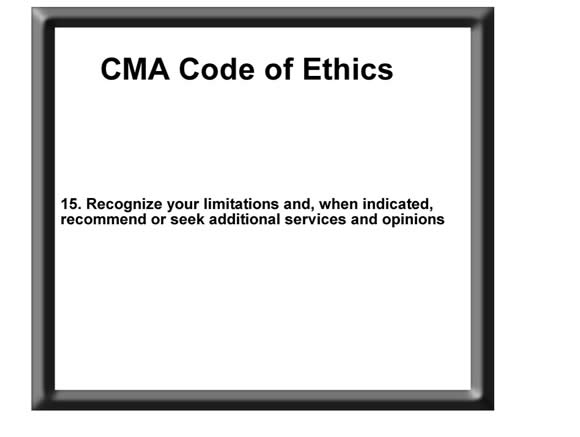Duty of Care
To Refer
No one doctor has all the answers and the Supreme Court of Canada has ruled that there is a duty to refer a patient to another doctor in some circumstances - this may mean to discuss the case with a colleague, request a formal consultation or to transfer care to anther physician.
There is no absolute test to apply to the circumstances when referral should be made, but generally it is when:
- The doctor is unable to make a diagnosis or inexperienced.
- The patient is not responding to therapy
- The patient needs treatment that the doctor is not competent to give
- The doctor is unable to continue care (vacation for example)
Patients sometimes also request a second opinion.
Timing is generally taken into account - was the referral made in a timely fashion?
It is also critical to make sure that all relevant information regarding the patient is communicated at the time of referral.
Vail v. MacDonald, [1976] 2 S.C.R. 825
Respondent M was admitted to hospital on March 19, 1969, in pain with a comminuted fracture of the tibia and fibula of the left ankle. He was referred by a staff physician to appellant as senior staff surgeon. The doctors were unable to find any pulse in the left ankle and applied a temporary cast pending the performance of an open reduction of the fracture site. The next day appellant visited respondent once and, despite respondent’s loss of feeling in the foot, made only a brief examination of the cast. On March 21 there were four visits and appellant opened the cast and took steps to prepare respondent for a diagnostic operation which took place on March 22. Respondent’s pain and discomfort continued and the condition of the leg seemed to worsen but it was not until March 25 that an anticoagulant drug was prescribed. Appellant did little or nothing to alleviate the worsening condition until April 16 when, with another surgeon, he amputated the toes of the left foot. It was then found necessary to amputate the whole foot above the ankle and this was done on April 24. Both the trial judge and the Court of Appeal found that appellant had been negligent insofar as he had failed to consult or obtain assistance from a specialist.


